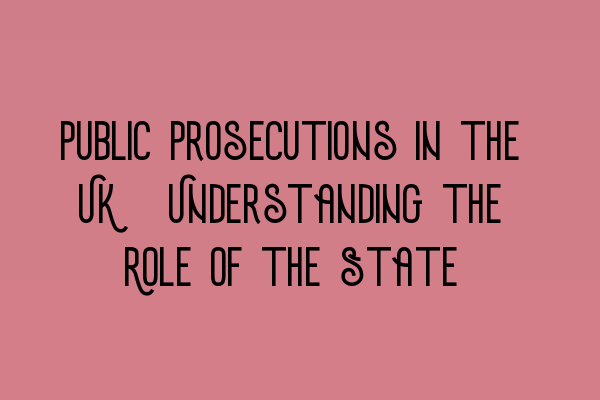Public Prosecutions in the UK: Understanding the Role of the State
Welcome to SQE Criminal Law & Practice Law UK, where we provide comprehensive resources and expertise for individuals
looking to understand and navigate the world of criminal law in the UK. In this blog post, we will delve into the critical
topic of public prosecutions and shed light on the crucial role played by the state in the criminal justice system.
The Basics of Public Prosecutions
Let’s start by defining what we mean by public prosecutions. In the UK, the primary responsibility for prosecuting
criminal offenses lies with the state, specifically the Crown Prosecution Service (CPS). The CPS acts on behalf of the
public and is tasked with bringing criminal cases to court. This includes deciding whether there is enough evidence to
prosecute and, if so, determining the appropriate charges.
If you are studying for the SQE 1 exam and want to test your knowledge of public prosecutions, you can check out our
SQE 1 Practice Exam Questions article, which
provides valuable practice questions to enhance your understanding.
The Role of the Crown Prosecution Service (CPS)
The CPS plays a vital role in the criminal justice process. It operates independently from the police and makes fair and
impartial decisions based on the available evidence. The primary duty of the CPS is to ensure that the right person is
prosecuted for the right offense.
To prepare for the SQE 2 exam and gain a deep understanding of the CPS’s role in public prosecutions, we recommend our
comprehensive SQE 2 Preparation Courses. These courses cover all
aspects of criminal law and practice, including the role of the CPS.
The Decision to Prosecute
The decision to prosecute is made based on the Code for Crown Prosecutors, which sets out the legal criteria for
prosecution. The Code outlines two main stages: the evidential stage and the public interest stage. Firstly, the evidential
stage assesses whether there is enough evidence to provide a realistic prospect of conviction. Secondly, the public interest
stage looks at whether it is in the public interest to proceed with a prosecution.
For aspiring solicitors preparing for the SQE 1 exam, we offer comprehensive SQE 1 Preparation Courses to help you master the foundational
principles of criminal law and understand intricate concepts such as the Code for Crown Prosecutors.
Prosecution Challenges and Accountability
While the CPS carries out its duties diligently, it is not immune to challenges and criticisms. The criminal justice system
must be fair, transparent, and accountable. However, mistakes and misconduct may occur, leading to wrongful convictions or
the failure to prosecute the guilty.
If you want to stay up to date on the latest developments in the UK criminal justice system, including important news and
changes to the role of public prosecutions, don’t forget to refer to our informative SRA SQE Exam Dates article.
Conclusion
In summary, public prosecutions in the UK are crucial to maintaining law and order and ensuring that justice is served.
The Crown Prosecution Service, acting on behalf of the public, plays a pivotal role in deciding whether to bring criminal
cases to court. Understanding the role and responsibilities of the state in public prosecutions is essential for aspiring
criminal law professionals.
If you want to deepen your knowledge of criminal law and practice, explore our range of comprehensive resources and
courses. Check out our SQE 2 Preparation Courses to prepare for
the SQE 2 exam and enhance your understanding of public prosecutions and other key topics.
